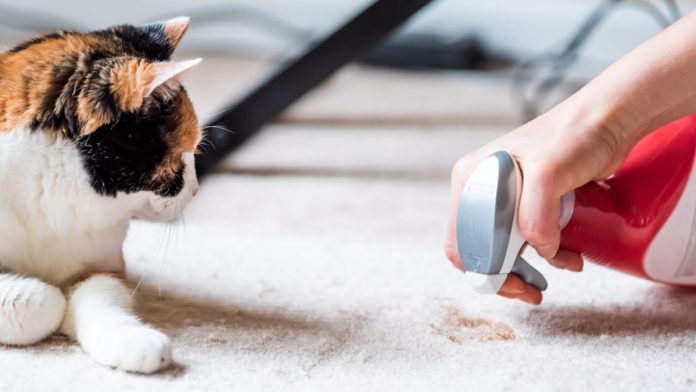A number of circumstances could explain why your cat might poop outside the litter box. Sometimes it’s a behavioral problem, but sometimes a health condition can get the cat out of its box. If left unchecked, a health problem such as a urinary tract infection can develop and lead to a potentially dangerous condition for your cat.
Below, we answer why cats are asked to defecate outside the litter box and how to prevent your cat from defecating inappropriately in the future.
Why do cats poop outside the litter box?
Most often, litter box problems are caused by a change in your cat’s routine or problems with his litter box. But if your home-trained cat suddenly stops using her box, your first step is to take your kitty to the vet to rule out any health problems.
Health problems
Sometimes, if your cat has diarrhea or constipation, the urge to go can be sudden and overwhelming and may not get to the litter box in time.1 This situation should be temporary, however, provided your kitten is unhealthy. If your vet determines that the problem has no physiological basis, they will likely move on to explore if your cat has a behavioral problem.
Stress and behavioral problems
A sudden change in your kitty’s bathroom behavior can be attributed to several possible causes, many of which boil down to feline stress. Smelly litter box: It is very common for cats to turn up their noses at a litter box if it does not meet their rigorous standards of cleanliness and smell. If it’s not spotless, even cats that have been litter-trained for years may turn down the box in favor of another area (usually the one that will grab your attention).
Wrong litter box location: is litter box location problematic for your cat? If it is near a door or in a part of the house that is heavily trafficked or where the cat cannot reach easily, consider moving it.1 Not recommended if your cat has dementia as it may cause more confusion.
House change: If another Cat Pooping Indoors or animal or even a newborn has been brought into your home or if someone has moved, moved or moved, your cat may simply be marking its territory. But keep in mind that any change in a cat’s routine or environment can cause stress, which can result in out-of-the-ordinary behavior.
How to stop your cat from peeing outside his litter box
In the absence of any health problems, take steps to prevent your cat from doing her dirty deeds somewhere besides her litter box.
Clean the box
First, collect lumps from the litter box every day and clean it thoroughly frequently. This means throwing out the old litter box, scrubbing the empty box with mild dish soap and warm water, rinsing it with clean water, letting it air dry, and pouring in a fresh supply of clean, odorless litter (sometimes scented litter is not attractive. for picky cats). Whenever you handle your kitty’s litter box, always use rubber gloves and a mask to protect yourself from microscopic bugs and litter dust.
Focus on the position
If you find that your cat is attracted to using a particular spot, such as a bath mat, such as a latrine, try to block its access to the room by installing a gate or closing / locking the door whenever possible. At the same time, encourage your pet to use the litter box as intended by placing it well away from the food and water bowls in a quiet, private area that is easy to reach.
Add another litter box
If you’ve added a second cat, consider adding extra bins, not trying to split the box for two cats. The optimal number of bins for each cat is one plus one. This means that if you have two cats, you need to provide three trash cans. Note that the boxes must be in completely different places. Otherwise, one cat may try to “control” և having all the toilets while keeping the other cat away.
Set Obstacles
If there is an area where your cat has been going frequently and you are unable to block its entry, try laying down aluminum foil or spraying the area with a kitty-safe deterrent. The goal is to make the wrong place as unwanted to cats as possible.
Redo the Case Status
Look up where your cat likes to make a mess and try to repeat that place in the trash can. For example, if your kit needs a tile, leave the bottom of the trash can empty. If it is facing paper, place the bottom of the box with paper; if it continues with the carpet, put the remaining carpet in its box.
Their Dangers
If, in spite of your best efforts, your cat gets dirty out of the garbage can for any reason, thoroughly clean the area with an enzymatic cleaner so that your cat does not pick up odors and think it is okay to go there again.
Kitty Does Not Like Kitty Litter
Cats have heavy paws and if the rubbish you give them does not feel right on them, your cat may choose to avoid it. This can be a problem for any type of litter (or any cat) but, more often, it occurs with hard, kernel-type, dirt, such as wheat or corn-based litters. It may take you some time, and money, but trying different types of waste (paper-based, plant-based, etc) allows you to get one of your kitty feels welcome.
Kitty Does Not Like Litter Box
Some kits like using the bathroom in an open-air area, some prefer walls, others prefer full privacy. Just like with kitty litter, you can experiment with boxes of different types, sizes, and types to get one of your cats feeling safe in them.

